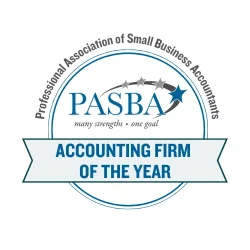For many business owners, taxes feel like a one-time event—something to deal with each spring, just in time for the filing deadline. But treating taxes as a once-a-year formality is a mistake that can cost you significantly.
If your only focus is tax preparation, you’re likely missing out on opportunities to reduce what you owe and plan for a more profitable future. Let’s look at the three pillars of effective tax management: preparation, planning, and strategy—and why each one matters.
Tax Preparation: The Compliance Cornerstone
Tax preparation is the most familiar concept. It’s what most people think of when they hear the word “taxes.” At its core, tax prep is about ensuring you file your return correctly and on time.
This process is largely reactive. It deals with what already happened in the previous year, leaving very little room to adjust outcomes or reduce liabilities once December 31 has passed.
A solid tax preparer ensures:
- Your return is filed accurately
- You’re in compliance with federal and state laws
- You avoid costly penalties and errors
But that’s where it ends. It’s about recording history—not changing it.
Tax Planning: Making Smart Moves Before Year-End
Tax planning goes a step further. Instead of looking back, you’re looking forward—reviewing your income, expenses, and financial picture before the year wraps up. It gives you time to act, adjust, and improve your tax outcome.
For business owners, tax planning might include:
- Timing equipment purchases to optimize deductions
- Adjusting retirement contributions to reduce taxable income
- Evaluating potential credits or changes in filing strategy
These aren’t abstract ideas—they’re actionable steps you can take before the year is over. With good planning, you’re not just filing your taxes; you’re actively shaping the result.
Tax Strategy: Playing the Long Game
Tax strategy takes the principles of planning and elevates them. It’s not just about saving money this year—it’s about designing a tax approach that aligns with your long-term financial and business goals.
This includes decisions that affect your overall wealth, like:
- Choosing the best entity structure (LLC, S-Corp, etc.)
- Leveraging real estate or depreciation for tax efficiency
- Structuring your compensation and benefits to optimize taxes
- Planning a future business exit in a tax-smart way
Where tax planning focuses on this year’s outcome, tax strategy looks at the big picture—how you can reduce taxes across your lifetime, protect assets, and grow wealth sustainably.
Why Most Business Owners Are Missing Out
Too many business owners only engage with their CPA when it’s time to file. They drop off the paperwork, hope for a refund, and move on. In doing so, they miss out on meaningful tax savings, not just now, but for years to come.
If that sounds familiar, here’s a simple way to shift your approach:
- Don’t stop at tax prep—see it as the foundation, not the full plan
- Set aside time mid-year to review your financials with a tax lens
- Work with professionals who understand strategy, not just compliance
This isn’t just about reducing taxes. It’s about creating a system that supports your goals—whether that’s reinvesting in your business, saving for retirement, or leaving a legacy.
Turning Tax Time Into a Business Advantage
Taxes will always be part of the equation—but they don’t have to be a stress point. With the right planning and strategic approach, taxes can become a tool you use to move your business forward.
At J.R. Martin & Associates, we help business owners take control of their taxes—not just survive them. Our team works with you throughout the year to uncover opportunities, reduce liabilities, and align your tax decisions with your long-term vision.
Ready to Stop Guessing & Start Planning?
If you’re ready to move beyond filing and start building a smarter tax future, we’re here to help. Learn more about our tax service packages at www.jrmartincpa.com.



